During the COVID-19 crisis, senior living communities and long-term care facilities have sometimes been wary about letting outsiders onto their premises, including home health and hospice clinicians.
That has repeatedly been a major challenge and point of concern for home health providers over the past several months, at times even leading to significant dips in revenue and worsening health conditions for patients.
In some cases, however, COVID-19 has been a catalyst to better relationships between home health and senior living operators. The keys to those successful relationships have been communication and a commitment to best practices.
“We do stay in constant communication with our partners,” Izzy Porter, a senior living program manager for Bayada Home Health Care, told Home Health Care News. “That coordination and collaboration is, I think, what really helps us stay successful in keeping our clinicians [and residents] safe.”
Moorestown, New Jersey-based Bayada is one of the largest nonprofit providers of home health and post-acute care services in the U.S. The company provides a range of in-home care services to adults and children across 345 locations in 22 states as well as seven other countries.
Its senior living partnerships have grown stronger throughout the pandemic, according to Porter.
While Porter’s job has intensified with COVID-19, the results of her work have gone a long way.
With less exposure to the outside world, senior living residents have been more susceptible to muscle weakness and subsequent falls. That’s why, on Bayada’s end, it has worked so hard to keep its employees safely entering facilities to see patients.
“We are seeing a lot of residents who aren’t necessarily impacted with COVID itself,” Porter said. “But what we are seeing is some of those secondary effects due to different communities adjusting their visitation schedules or disallowing residents to go and see family. So we’re seeing a lot of people who are a little bit deconditioned because they’re not engaging in the activities that they used to.”
Karen Garland — the regional director of Exton, Pennsylvania-based Vantage Point Retirement Living — has witnessed similar issues, she told HHCN.
“[Seniors] have been quite isolated,” Garland said. “They have been limited in their ability to have people visit because of certain restrictions or safety measures. And obviously, when you live in one of these areas, or one of these settings, it’s supposed to be about family involvement.”
Vantage Point Retirement Living provides residential options to seniors in Pennsylvania, Delaware and Maryland. As a part of its network, the company offers active adult, full service retirement and senior living communities.
Garland will serve as the executive director of Arcadia at Limerick Pointe, one of Vantage Point’s newest senior living communities. Limerick, Pennsylvania-based Arcadia at Limerick Pointe is a faith-inspired senior living community offering independent living, supportive personal care and memory care.
It is set to open later this year, with support from Bayada to facilitate home health services.
Instead of accepting the emotional and physical toll that comes with COVID-19 as just another reality during a pandemic, Bayada and Vantage Point employees have worked hard at making their relationship work for the betterment of their seniors’ situations.
“With COVID, we wanted to partner with people who have really been right in the trenches like Bayada has,” Garland said. “Whether it’s been in home health, assisted living or personal care, they’ve been right there [through it all].”
When looking at home health providers to partner with, Vantage Point considers many things, but especially staffing. That way, when things get tough, the home health provider is able to fill staffing gaps with ease and has the resources to keep caring for seniors inside of communities in a safe manner.
Vantage Point also wants home health workers to understand — and be a part of — the senior living community.
Bayada’s openness to sitting down with senior living providers’ executives and finding out how they can service their communities better has been “very important” to Vantage Point, Garland said.
“We have certain policies and procedures in place to ensure the safety of our members — and that is very, very big,” Garland said. “So we’re looking to partner with people who are open minded, who are aware of best policies and best practices, and who will be excited to learn about our community and our company.”
From Porter’s standpoint, that means reaching out to Bayada’s senior living partners on a daily basis.
“For me, it makes me feel a lot better when, if there’s a small change,” Porter said. “I get an email from the community itself, because then everyone is on the same page.”
Bayada’s goal is to be the eyes and the ears of its senior living partners’ communities. Its caregivers and clinicians strive to be there to help with anything, from personal assistance to screenings.
Its methods have enabled it to maintain its partnerships with facility-based providers nationwide — and more importantly, keep prioritizing seniors’ health within those communities.
“Our plan isn’t to be just a provider,” Porter said. “Our plan is to make it so that residents see us and they feel like we are part of the community, because we have dedicated teams that are in these communities. We’re limiting people’s visits between different places, which does help to prevent the spread. But it also helps to make people feel a little bit more at ease.”
Senior living providers have become more interested in home- and community-based care themselves over the years. Over half of the U.S.’s largest nonprofit senior living organizations now offer some sort of home- and community-based services, according to a recent report from LeadingAge and Ziegler.
Nearly 65% of the largest 25 providers offered some sort of home- or community-based service.
Garland and Porter will discuss COVID-19’s impact on aging services providers and seniors during a Wednesday webinar.




